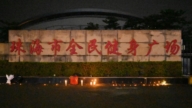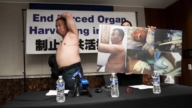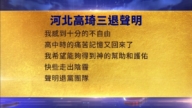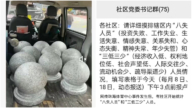【新唐人2013年01月08日訊】中國網民7號在廣州「南方報業集團」大樓門口獻花,聲援《南方週末》編輯部。網友還在網上貼出各地《南方日報》記者站的地址,提供給需要到實地表達立場的網友。6號晚間,《南方週末》報社員工通過各種渠道發表聯署聲明,部分編輯記者宣佈罷工。中國境外媒體認為,這似乎是中國媒體人的「起義」到來!但是,大陸媒體人這條籲請新聞自由及憲政民主的抗爭路能走多遠?請看本臺記者的分析報導。
《南方週末》2013年新年獻詞被竄改,違反出版程序事件,官方媒體避而不報,微博世界卻相當熱鬧,聲援《南方週末》行動,得到來自媒體同行、律師、學者、高校學生、作家、企業家、演藝界人士及中國網民的廣泛支持,有媒體指稱,聲援的南周事件,逐漸演化為一場籲請新聞自由及憲政民主的抗爭運動,像是媒體人的「起義」到來。
不過《南方週末》新浪官方微博1月6號晚間發表聲明,指稱新年特刊導言不是早前媒體人傳出的是廣東省委宣傳部部長庹震操刀,而是「報社負責人草擬」。
在此之前,《南周》官方微博管理人吳蔚已經通過個人微博透露,《南周》官方賬號他已上交上級相關負責人毛哲,他不再對今後發佈的內容負責。
而經官方認證的報社經濟部微博,也發表署名南周編輯部的聲明說:南方週末新浪官方賬號已被強行收繳,此微博在2013年1月6號21點30分發表的《致讀者》,並非真相,他們將陸續通過公開途徑發佈準確信息。包括《南周》編委、經濟部、文化部、新聞部等幾十位記者聯署了這份聲明。同時已經有多位《南周》記者開始罷工表示抗議。
但報社經濟部微博以及多位跟進發佈事件進展的媒體人的微博,很快的遭到官方刪除。
而中國網友發起1月7號到《南方日報》大院門前獻菊花行動,一名到現場獻花的女士向媒體表示,否認庹震竄改新年獻詞,「這是藐視網民的智商」,所以她前去獻花﹗聲援《南方週末》。
現場網友還打出標語:「取消新聞審查、聲援南方週末、要求新聞自由」,並且說,站在現場的都代表《南方週末》,他們紛紛喊出「我是南周」。
原中央某機關報中層負責人劉亞偉:「我90年代曾經在一個中央部委的報紙,做過總編室主任,像這種情況是很常見,但是現在是一個眾媒體的時代,並且大家的民智也已經不是那個時代了,但是這幫官員還是採取那種管理媒體的方式,認為,媒體嘛!就都是他們的領域,他們想幹啥就幹啥,他們就忽略了現在時代的特點。」
不過,這名原中央某機關報的中層負責人劉亞偉認為,輿論陣地是中共當局的死穴,他們不會輕易放開。他說,不要期望當局退讓。而北京獨立製片人朱日坤也向《新唐人》表示,他對抗爭的結果感到「不樂觀」。
北京獨立製片人朱日坤:「我覺得現在也還不能非常樂觀,因為雖然說有不少的人在聲援,然後南方週末他們本身的很多人,也出來表示自己的態度,只是…實際上可能很多人只是希望解決本身這個問題,而並不一定是說爭取一個完全的新聞的自由。」
朱日坤說,這場抗爭對整個新聞業會有一點幫助,但是反過來說,這也是在延續新聞審查的制度。
而中國新媒體人北風向《德國之聲》表示,媒體人會提出甚麼樣的訴求,將決定事件未來走向和意義。他們罷工這種激烈的行為,「路能走多遠,這要看他們的決心和勇氣。」
採訪/常春 編輯/周平 後製/蕭宇
How Far Will Southern Weekly’s Protest Go?
On January 7, Chinese netizens presented flowers
outside the Southern Daily Group’s office building in Guangzhou, in support of Southern Weekly.
Netizens even posted on the internet the addresses
of the newspaper’s bureaus across China.
On January 6, joint announcements by the Southern
Weekly staff appeared through various channels.
Some editors and journalists even staged a strike.
Overseas media view it as an “uprising" by China’s media.
The forced alteration of Southern Weekly’s 2013
New Year message was ignored by official media of the Chinese Communist Party (CCP).
In contrast, it has become a heated
topic in the micro-blog world.
The Southern Weekly has gained wide public support
from media professionals, lawyers, scholars, college
students, writers, entrepreneurs, entertainers, and netizens.
The Southern Weekly incident was reported to have
evolved into a protest, calling for media freedom
and constitutional democracy, as a media “uprising".
In the evening of January 6, the Southern Weekly’s
official Sina microblog (Weibo) released an announcement.
It claimed that the New Year editorial was not altered
by Tuo Zhen, Guangdong CCP propaganda chief.
Rather, it was “drafted by a chief of the newspaper”.
Prior to that, Wu Wei, administrator of the newspaper’s
official Weibo account, made a personal announcement.
Wu said he had turned in the password for Southern
Weekly Weibo account to his boss Mao Zhe.
He would no longer be responsible for
any content published by that account.
An announcement in the name of Southern Weekly
editorial office was published on the official Weibo
account of the newspapers’ Economy office.
It said that Southern Weekly’s official Weibo
account had been “forcedly taken over”.
The “Messages to Readers” published by that account
at 9:30pm on January 6, 2013 was not the truth.
They would gradually disclose accurate
information through public channels.
Dozens of Southern Weekly reporters
signed the announcement.
Meanwhile, some journalists at the
paper launched a strike to protest.
But soon after, the CCP authorities removed the
official Weibo account of Southern Weekly Economy.
So were Weibo accounts of several media
professionals who published follow-up reports.
Netizens initiated a drive to present chrysanthemum flowers
outside the Southern Daily’s headquarters on January 7.
Media reported that a female participant said the denial
of Tuo Zhen’s alteration was “defiance of netizens’ IQ’s”.
That was why she joined in presenting
flowers to support the Southern Weekly.
On-site netizens held banners reading, “Abolish Censorship,
Support Southern Weekly, Demand Media Freedom.”
They even shouted together, “I’m the Southern Weekly.”
Liu Yawei, former middle manager
of a CCP official newspaper:
“In the 1990s, I was in charge of the Chief Editor’s
Office for a CCP central official newspaper.
An incident like this is really commonplace in practice.
But now it’s an era of mass media, and the Chinese
people aren’t that fooled as they were in the past.
But CCP officials still used their old practices
to control media, just doing whatever they want.
They overlooked the features of this era, indeed.”
Liu Yawei remarks that media is the CCP regime’s
Achilles Heel, and they will not loosen media control.
He warns not to expect CCP’s concession.
Zhu Rikun, independent filmmaker in Beijing,
says that he is “not optimistic” about the outcome.
Zhu Rikun: “I don’t think it’s very optimistic.
Now there’s wide public support, and the
Weekly’s staff also announced their position.
But, lots of people just did it to solve the problem
itself, not exactly to strive for a full media freedom.”
Zhu Rikun says the protest will slightly help
China’s media, but on the other hand, there
is also a continuous censorship of press.
Media veteran Bei Feng told Deutsche Welle that media
professionals’ demands will decide how the event evolves.
As for their strike, Bei Feng comments that how far they
can go is dependent on their determination and courage.



























